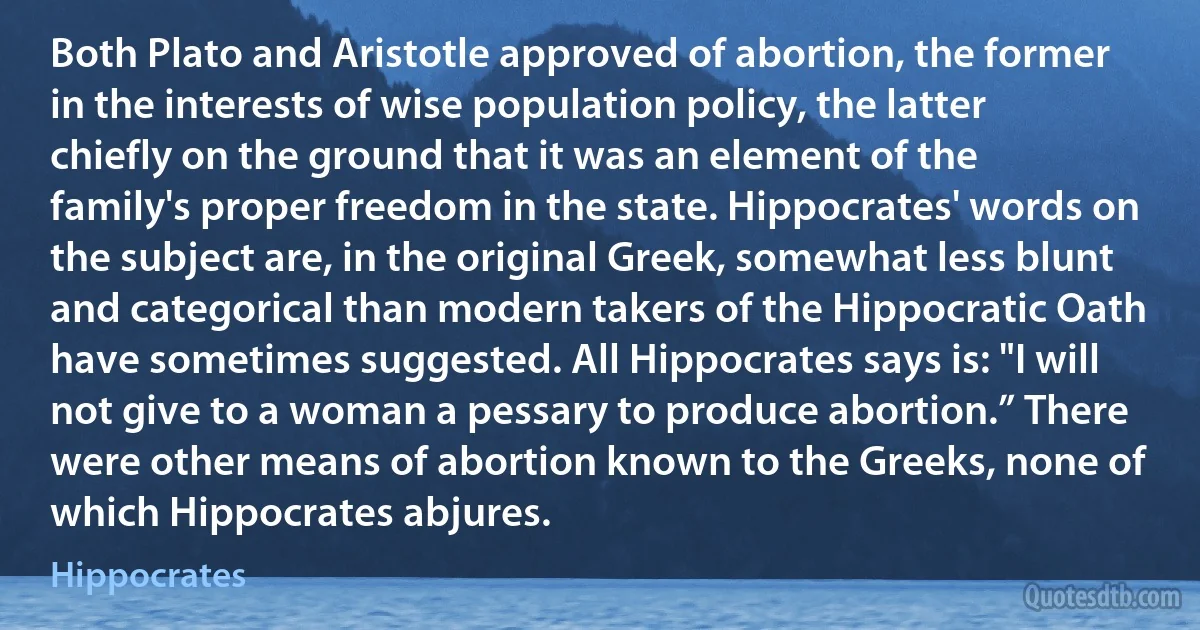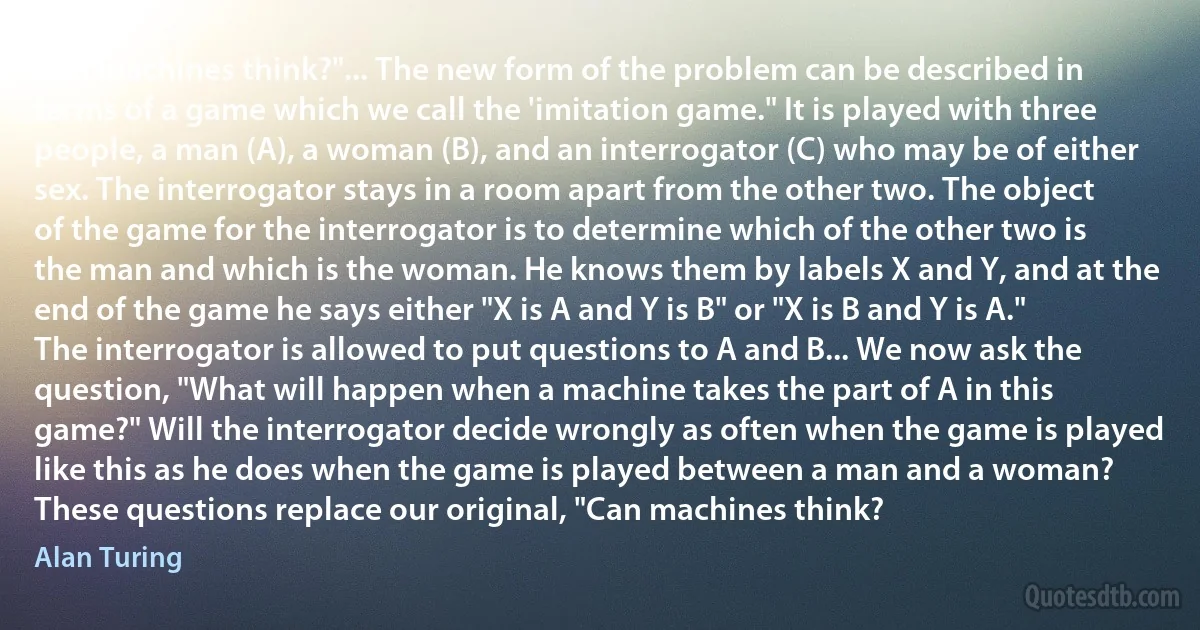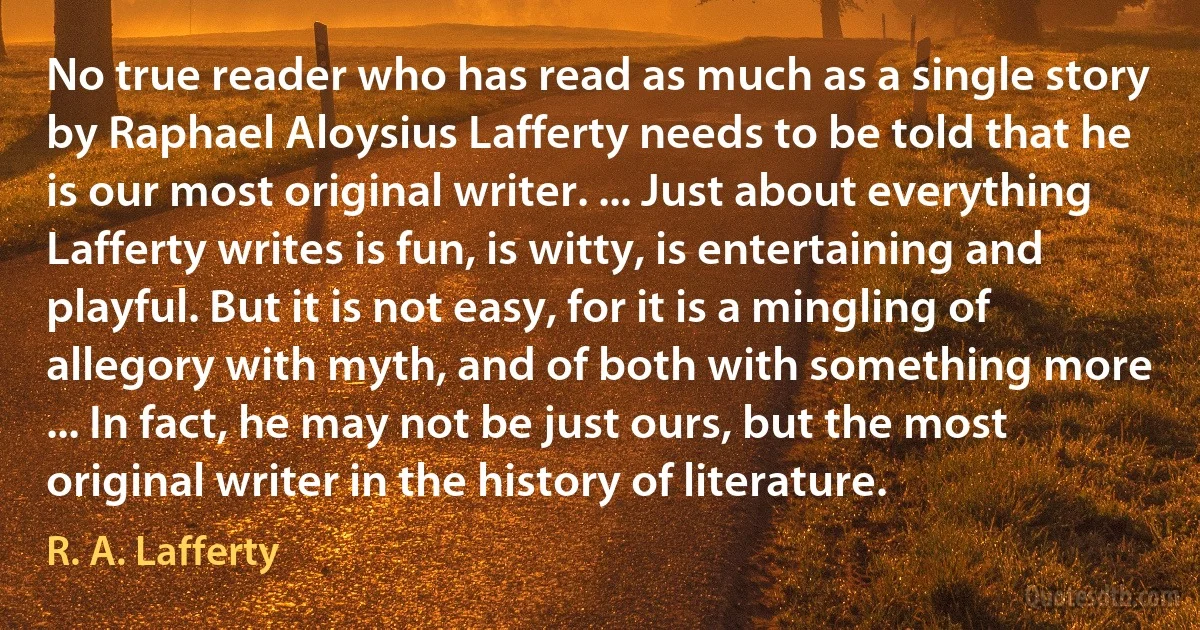Original Quotes - page 67
Every book, ever editor, every teacher will tell you that the great key to success in authorship is originality....It is well to understand as early as possible in one's writing life that there is just one contribution which every one of us can make: we can give into the common pool of experience some comprehension of the world as it looks to each of us. There is a sense in which everyone is unique. No one else was born of your parents, at just that time of just that country's history: no one underwent just your experiences, reached just your conclusions, or faces the world with the exact set of ideas that you must have. If you can come to such friendly terms with yourself that you are able and willing to say precisely what you think of any given situation or character, if you can tell a story as it can appear only to you of all the people on earth, you will inevitably have a piece of work which is original.

Dorothea Brande
During a later period of his life, Rembrandt became bankrupt, mainly through his own extravagance... he could not help but collect things. At this time, his marvelous collection of paintings, jewels, swords, armor and precious costumes were publicly sold for a pittance. He had to leave his big, beautiful house in the fashionable part of Amsterdam and go to a very poor quarter. His original, fine house is now open to view. He dressed his subjects in oriental costumes, weapons and armor to give a rich, romantic and mysterious radiance to his paintings. At the same time he was a very down-to-earth Dutchman with a passion for reality. His art is the synthesis of a tremendous attraction to reality, with a need to draw things as they really were, and a desire for the exotic, the dramatic, the radiant, the unusual and the mysterious. p. 402.

Rembrandt
In approaching a problem a Marxist should see the whole as well as the parts. A frog in a well says, "The sky is no bigger than the mouth of the well." That is untrue, for the sky is not just the size of the mouth of the well. If it said, "A part of the sky is the size of the mouth of a well", that would be true, for it tallies with the facts. What we say is that in one respect the Red Army has failed (i.e., failed to maintain its original positions), but in another respect it has won a victory (i.e., in executing the plan of the Long March). In one respect the enemy won a victory (i.e., in occupying our original positions), but in another respect he has failed (i.e., failed to execute his plan of "encirclement ant suppression” and of "pursuit and suppression”). That is the only appropriate formulation, for we have completed the Long March.

Mao Zedong
The theory of biological evolution is based on the struggle for life and the survival of the fittest. Yet cooperation is common between members of the same species and even between members of different species. Before about 1960, accounts of the evolutionary process largely dismissed cooperative phenomena as not requiring special attention. This dismissal followed from a misreading of theory that assigned most adaptation to selection at the level of populations or whole species. As a result of such misreading, cooperation was always considered adaptive. Recent reviews of the evolutionary process, however, have shown no sound basis for viewing selection as being based upon benefits to whole groups. Quite the contrary. At the level of a species or a population, the processes of selection are weak. The original individualistic emphasis of Darwin's theory is more valid.

Robert Axelrod
I remember having terrible nightmares during the trial, feeling that the police were misunderstanding things badly because they insisted that Sutcliffe had a moral stand. To me it was clear his crimes expressed a simple, virulent loathing of the female which did not need fancy explanations like those arrived at by the police. The thing is that most people in the book are not what ordinary people would describe as outcasts; they are ordinary men. That was why it was important to end up with the Ripper. Because what is important about him is that he is not different; it's only a question of degree.
I don't go along with the idea that all men are rapists or that they are the product of Original Sin, rather that we have a culture which supports and encourages misogyny and what we have to face is that a sizeable number of men hold very strange and perverted views about women.

Joan Smith
Whenever I'm to translate from Spanish to English, I always stop to think of the what but, just as importantly, of the how I'm going to translate what is said by the characters or what is in the narration. If I used an adage, an axiom, a proverb, a maxim, etc., there are always equivalents but as said previously, one mustn't translate literally, word for word, because that doesn't work. One has to analyze what is in the original to make the point with an equivalent adage or axiom; if there's none, there must be something close to the original, and I'll go with that. What one looks for is meaning....

Rolando Hinojosa-Smith
That's right. We didn't want the Giants to have Clemente and a fellow like Willie Mays in the same outfield. It was a cheap deal for us. The Giants wanted him badly but didn't want to make him a bonus boy and have him sit on the bench. But we didn't care as long as we nailed him. We put him on the Montreal roster, exposing him to the unrestricted draft, figuring we could get back our original investment. We have a letter from the commissioner's office to the effect that we could get back our investment if he were drafted, but we then we later learned that all we could collect was $4,000. So, all right. It cost us $6,000, actually; but the Giants didn't get him, which was the important thing.

Roberto Clemente
The misunderstandings have seemed to come from comparing fluxus with movements or groups whose individuals ‘have had some principle in common, or an agreed-upon program. In fluxus there has never been any attempt to agree on aims or methods; individuals with something unnameable in common have simply naturally coalesced to publish and perform their work. Perhaps this common something is a feeling that the bounds of art are much wider than they have conventionally seemed, or that art and certain long-established bounds are no longer very useful. At any rate, individuals in europe, the us, and japan have discovered each other's work and found it nourishing (or something) and have grown objects and events which are original, and often uncategorizable, in a strange new way.

George Brecht
None are so easily taken in as the "knowing ones." The knowing one is generally an egregious ninny. The man who loses his last shilling at Doncaster, is no other than he who was sure of winning; who could prove by his betting-book that he must win by backing Chaff against the field. He is a fine specimen of the family of Oldbirds. So is the careful, cautious wight, the original Master Surecard, the man of many savings, who in his old age falls in love with a loan; who dies in prison from the pressure of foreign bonds, or drowns himself in the new canal by way of securing what he calls his share. The genuine old bird is a pigeon.

Samuel Laman Blanchard
Everyone who achieves strives for totality, and the value of his achievement lies in that totality-that is, in the fact that the whole, undivided nature of a human being should be expressed in his achievement. But when determined by our society, as we see it today, achievement does not express a totality; it is completely fragmented and derivative. It is not uncommon for the community to be the site where a joint and covert struggle is waged against higher ambitions and more personal goals. ... The socially relevant achievement of the average person serves in the vast majority of cases to repress the original and nonderivative, inner aspirations of the human being.

William D. Tammeus
In 1858 he was selected by [the British Association] to prepare a report upon the Theory of Numbers. It was prepared in five parts, extending over the years 1859-1865. It is neither a history nor a treatise, but something intermediate. The author analyzes with remarkable clearness and order the works of mathematicians for the preceding century upon the theory of congruences, and upon that of binary quadratic forms. He returns to the original sources, indicates the principle and sketches the course of the demonstrations, and states the result, often adding something of his own. The work has been pronounced to be the most complete and elegant monument ever erected to the theory of numbers, and the model of what a scientific report ought to be.

Henry John Stephen Smith
Strength of character does not consist solely in having powerful feelings, but in maintaining one's balance in spite of them. Even with the violence of emotion, judgment and principle must still function like a ship's compass, which records the slightest variations however rough the sea. (Original German: "Ein starkes Gemüt ist nicht ein solches, welches bloß starker Regungen fähig ist, sondern dasjenige, welches bei den stärksten Regungen im Gleichgewicht bleibt, so daß trotz den Stürmen in der Brust der Einsicht und Überzeugung wie der Nadel des Kompasses auf dem sturmbewegten Schiff das feinste Spiel gestattet ist.")

Carl von Clausewitz
We do not see faith, hope, and charity as unattainable ideals, but we use them as stout supports of a nation fighting the fight for freedom in a modern civilization.
Faith - in the soundness of democracy in the midst of dictatorships.
Hope - renewed because we know so well the progress we have made.
Charity - in the true spirit of that grand old word. For charity literally translated from the original means love, the love that understands, that does not merely share the wealth of the giver, but in true sympathy and wisdom helps men to help themselves.

Franklin D. Roosevelt
The original scriptures of most religions are poetical and unsystematic. Theology, which generally takes the form of a reasoned commentary on the parables and aphorisms of the scriptures, tends to make its appearance at a later stage of religious history. The Bhagavad-Gita occupies an intermediate position between scripture and theology; for it combines the poetical qualities of the first with the clear-cut methodicalness of the second... one of the clearest and most comprehensive summaries of the Perennial Philosophy ever to have been made. Hence its enduring value, not only for Indians, but for all mankind.

Aldous Huxley
They [US officials] say they want to impose a democratic model. But that's their democratic model. It's the false democracy of elites, and, I would say, a very original democracy that's imposed by weapons and bombs and firing weapons. What type of democracy do you impose with marines and bombs?

Hugo Chávez
A plant, an animal, the regular order of nature - probably also the disposition of the whole universe - give manifest evidence that they are possible only by means of and according to ideas; that, indeed, no one creature, under the individual conditions of its existence, perfectly harmonizes with the idea of the most perfect of its kind - just as little as man with the idea of humanity, which nevertheless he bears in his soul as the archetypal standard of his actions; that, notwithstanding, these ideas are in the highest sense individually, unchangeably, and completely determined, and are the original causes of things; and that the totality of connected objects in the universe is alone fully adequate to that idea.

Immanuel Kant
Labour was the first price, the original purchase-money that was paid for all things. It was not by gold or by silver, but by labour, that all the wealth of the world was originally purchased; and its value, to those who possess it, and who want to exchange it for some new productions, is precisely equal to the quantity of labour which it can enable them to purchase or command.

Adam Smith



